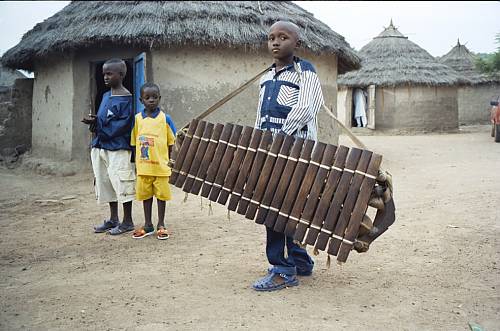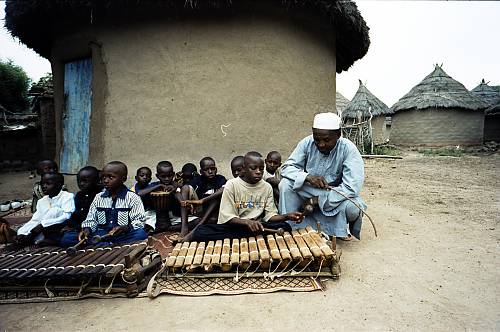The world’s oldest balafon, a musical instrument similar to xylophone known as the “Sosso-Bala”, has been in existence since the 13th Century. The ancient West African instrument can be found in Nyagassola town on the Mali-Guinea border.
According to written and oral histories, the balafon was either manufactured by the king himself or given to him by a jinni (genie). In 2001, the Sosso-Bala was named a masterpiece of the oral and intangible heritage of humanity by UNESCO.
It is sacred and perceived as the symbol of the freedom and cohesion of the Mandingue community, which is spread across a territory that once belonged to the Empire of Mali, according to UNESCO
The instrument consists of 21 slats made of rosewood. The slats serve as the keys and they are tied together with nylon strings, or sometimes antelope or goatskin. underneath each key are gourds to amplify the sound while bamboo trees make up the thin base.

The original Sosso-Bala is reportedly preserved in a round mud hut with other sacred and historical objects in the village of Nyagassola in northern Guinea, an area occupied by the Dökala family, the Kouyaté griots of Nyagassola.
The 13th-century instrument cannot leave the village unless it is carried on the back of its keeper. It is brought out of its hut once a year for ceremonial playing.
Originally owned and played by King Sumaoro Kanté, who succeeded to the Sosso throne in the early thirteenth century, the balafon has transmitted epic poems down through the centuries, principally the Sunjata epic that comprises hymns to the glory of the builder of the Mali Empire.
According to reports, 800s of years ago, emperor Sundiata Keita, who founded the Mali empire, appointed Kouyaté’s family as guardians of the balafon. Since then, every male relative has learned to play what is considered a sacred instrument.
“They’re oral historians, musicians and performers that hold the history of the Mandé people of Mali, Guinea and other nations. Thus, to play the balafon is Kouyaté’s inheritance, a sacred rite”.
The Balatigui, the patriarch of the Dökala family, is the guardian of the instrument. He is the only one who is allowed to play the Sosso-Bala on important occasions, such as the festival of the Muslim New Year and at burials. He is also responsible for teaching the balafon to children from the age of seven upwards.

“A lot of those songs we’re playing are not just entertaining people, it’s songs related to war, and songs related to happiness and celebrating the victory,” Balla Kouyaté said. “We are like the healers in our society.”
“For me, I would say there’s nothing in this world that would make me happy more than playing this instrument,” Kouyaté said. “I hope I can be a millionaire or billionaire one day but even if I have a billion [dollars], it won’t make me happy more than playing this balafon.”
For years, the Balatigui and other members of Dökala family, who are hereditary musicians have devoted themselves to transferring their knowledge and skills to future practitioners.
Apart from being a national treasure in Guinea, the over 800-year-old instrument reminds the Mande of their glorious past. Today, the African balafon tradition continues to play an important part to preserve the cultural identity of the Mande peoples in West Africa.








